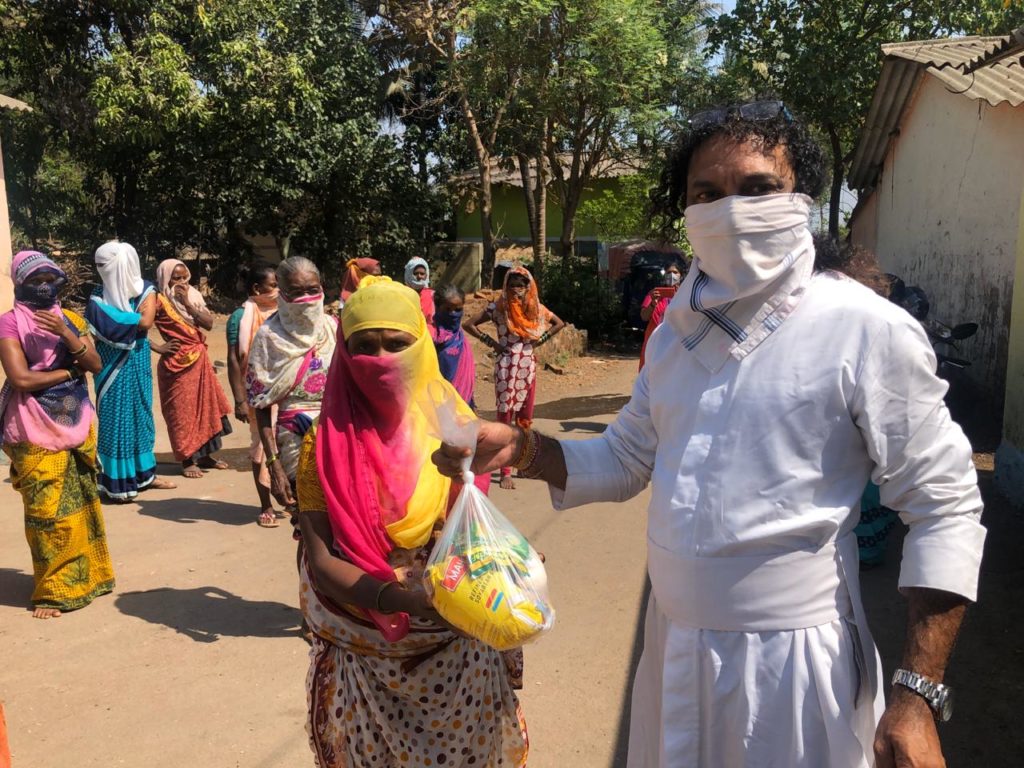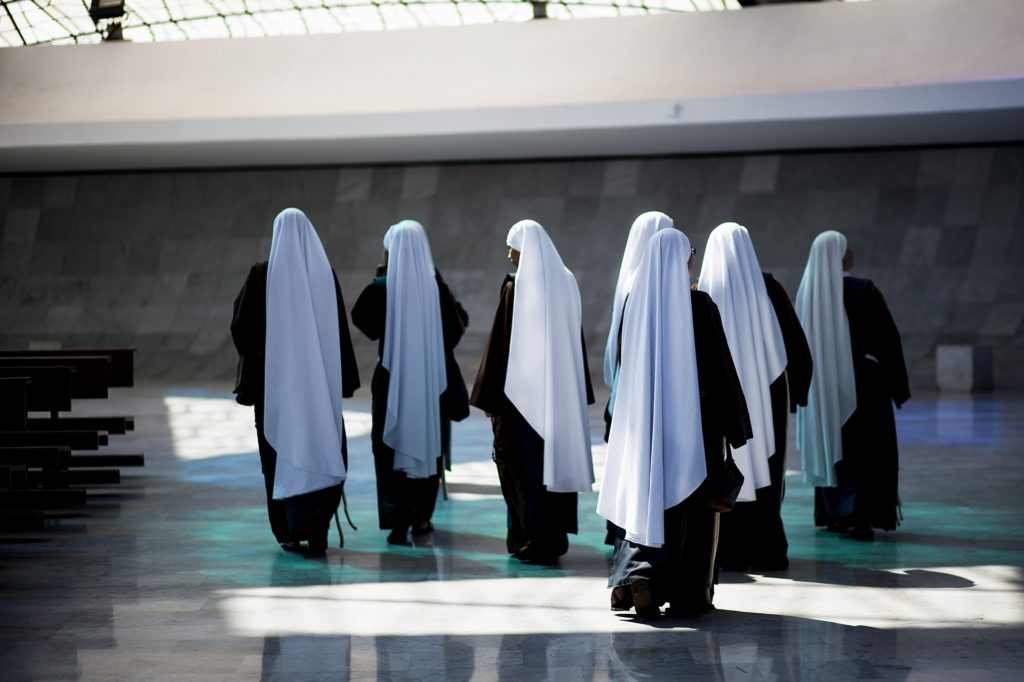SPECIAL REPORT • MISSION IS COMMUNICATING LIFE

Leave Security On The Shore
Difficulties serve as a stimulus to the true evangelizer who joins hands with people of different persuasions in the cause of the common good. Witnessing the core message: “You are important. God loves you”
BY Archbishop Thomas Menamparampil, SDB | Archbishop Emeritus of Guwahati, India
WHEN A group of Galilean fishermen were told that their mission was to take their Master’s message to the ends of the earth, they must have been stunned, feeling totally unprepared. What was proposed was an impossible task. However, there was the Lord’s assurance that raised their morale: “I am with you always” (Mt 28: 20). That promise alone gave them absolute confidence to step forward to attempt the ‘impossible’—and they did go forth, leaving ‘security on the shore’. Millions have followed their example with the same confidence.
Olympic athletes seek to develop a ‘winning mindset’, and they win. Nietzsche used to say, “The value of a thing lies not in what one attains with it, but in what one pays for it—what it costs one”. We remember how early Christian martyrs paid a heavy price for their faith. This revealed the worth of Christianity, and millions of people embraced it with enthusiasm. Martin Luther King’s convictions touched the conscience of America because he witnessed to them with his life. It is only with such eloquence of life that you can draw people to your religious convictions as well.
Reaching out
No doubt, missionary life is challenging. Many early missionaries died martyrs. The same price was paid recently in Turkey, Yemen, Syria and other places. Others moved across oceans, crossed mountains, penetrated deep forests, learnt to deal with people of other religions, cultures, and languages, always ready to face every kind of difficulty including stiff opposition and outright rejection. Today, the barriers they have to cross may be oceans of psychological distances, mountains of scepticism, and vast forest tracts of indifference. They may have to learn to confront new forms of resistance, prejudices, suspicions, fears, hatred, and stiff opposition.
What looks like ‘impossible’ somehow has an irresistible pulling power. As some were drawn to lofty mountains and distant poles, others have been drawn to radical self-giving to challenging social situations. They found it self-rewarding.
The greatness of a person is the eagerness to make others great. That is what a missionary does: sharing life and thought, energy and joy with others. It reveals itself in humanness, concern, respect for people and their ideas. His core message is this: “You are important. God loves you”. They do not cry ‘horrible’ or ‘impossible’ before the rising mountain of scepticism or indifference. Difficulties only serve as a stimulus to the true evangelizer.

We are living in an age when even ardent believers are losing their faith and religious teachers themselves are shaken. Many of our rural youth who move to metropolitan cities to pursue their studies or in search of jobs stand in danger. If, then, educated Catholic youth are facing difficulties, what about hundreds of thousands of others, young and old, ill instructed and feebly shepherded in the distant villages. They are like the “sheep without a shepherd” (Mk 6: 34) that Jesus spoke of.
We need suitable and effective ways of teaching and instructing “each other with all wisdom” (Col 3: 16). Church activities such as helping people in situations of poverty, illiteracy, ill health, injustice, discrimination, and other difficulties need new and creative approaches, becoming more purposeful and spiritually motivated in their goals, and more effective in action, better thought out in their sustainability.
Communities, cultures and values
The mobility of people initiated by the Industrial Revolution and strengthened by globalization, has led many to distancing from their own cultural roots, losing ethical values and the breaking up of families whose members live and work apart. Social structures such as those of the extended family, school, neighbourhood, traditional patterns of social formation that helped to hand down religious convictions among generations have come to be disrupted. Consequently, there has been a sharp interruption in the handing on of faith and of cultural and ethical values.
A fragmented and disoriented society is fertile soil for violence, or to surrender to a ‘strong leader’ who pursues aggressive goals, or to support various forms of newly emerging fascism, seeing non-performance in the more tame traditional set of leaders.
Political use of religion
In many countries, a majority community uses religion to assert its dominance over the rest of the nation, harassing and marginalizing minority communities, which has nothing to do with spirituality or moral convictions, but is a political use of religion. This has led to exaggerated forms of religious self-expressions, interference in the cultural habits of weaker communities, mutual hatred, and communal clashes. The fundamentalist groups that spearhead these movements profess fanatical loyalty to their own community at the exclusion of others. The harassment of Christians in general, and of missionaries in particular, has become a frequently recurring phenomenon. People do not like to see in religion either superficiality or fanaticism, but depth of convictions about values that abide. They respect persons with profound convictions, who live by them.

That is what a missionary does: sharing life and thought, energy and joy with others
Today we need bridge-builders, who, in spite of difficulties with fundamentalists and radicals, search for a shared worldview, common ethical values and a joint approach to global problems.
As an answer to those who exaggerate on the side of secularization or fundamentalism, we need a sense of balance with self-criticism too.
Give unto Caesar what belongs to Caesar and to God what belongs to God, seems the right approach in evangelization, joining hands with people of different persuasions in the cause of the common good: e.g. ethical values, liberty, reform, rights of individuals, upliftment of women, respect for diversity, minority rights, protection of the environment.
A genuine missionary has a helpful and encouraging message for everyone in every situation, as Christ Himself had. “Be ready at all times, to answer anyone who asks you to explain the hope you have in you, but do it with gentleness and respect” (1 Pet 3: 15).
Persuasive power
Therefore, the missionary does not rush into hasty condemnations, nor does he give readymade unreflected answers to knotty problems in fast-changing situations; nor simplifies matters by summarizing all Christian teaching into a series of negative messages: cautions, prohibitions, warnings, and threats. On the contrary, the Christian message is eminently positive, as Pope Francis emphasises in numerous occasions. In simple language, the Christian message states, God offers His love to you so that you may extend it to others, as Christ did. Thus, the Christian worker is not merely a goal-driven or purpose-driven achiever, but a ‘love-driven’ hero/heroine.

History has thrown up strongmen-type of leaders such as Hitler and Mao in times of anxiety and confusion. Maybe, it is happening now again; for such ‘leaders’, power is coercive, calls for resistance and it lasts as long as there is ongoing coercion. Persuasive power, on the contrary, wins voluntary acceptance; it touches the heart, convinces the minds and empowers the weak. It uncovers hidden potential in persons and unnoticed resources in situations. People who serve a cause with enthusiasm reveal passion and fervour. If they are in the service of the Gospel, their fervour spills into the lives of others.
Spiritual depth and human relationships
History is shaped not only in the battlefields, but also in study groups, thinkers’ clubs, workshops, classrooms, lecture halls, libraries, laboratories, adoration chapels, and cloistered convents—and through the intense sharing of the Gospel. Certain serious matters are whispered in the ear, intimately shared, not proclaimed from housetops.
What should be emphasized most of all in a missionary context is relationship. Jesus called His disciples “to be with him” (Mk 3: 14). As He said, “The Father and I are one” (Jn 10: 30). He also said, “As the Father knows me and I know the Father; in the same way I know my sheep and they know me (Jn 10: 14–15). The entire Last Supper discourse is intense with references to relationships; it is a narration about co-belonging. It is in this context of warm-hearted relationship, that a look of Jesus, a gentle gesture, a touch, a word, a tear, a sigh, and even silence made an impact; it communicated powerfully. It is to this relationship He sought to invite others who were beyond the fold (Jn 10: 16). We must belong; evangelization is an invitation to belong.

We must belong; evangelization is an invitation to belong
This is the message that we carry to everyone in the missionary field: the so-called ‘periphery’, villages, slums, urban corners, forgotten flats, broken homes; while meeting with people, dialoguing with individuals, conversing with families, meeting with teams of fellow pastoral workers, women, young people, children—even engaging in conversation with groups in conflict, at the risk of one’s life.
It is in this spirit of strengthening relationships, that we organize parish events: feasts, devotions, retreats, family encounters; meetings of different groups and associations. When the effective organization of such pastoral programmes or the risks we take for the Gospel cost us a great deal, we ought to remember, “Life grows by being given away. Indeed, those who enjoy life most are those who leave security on the shore and become excited by the mission of communicating life to others” (EG 10).
